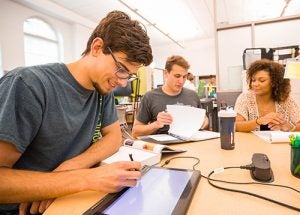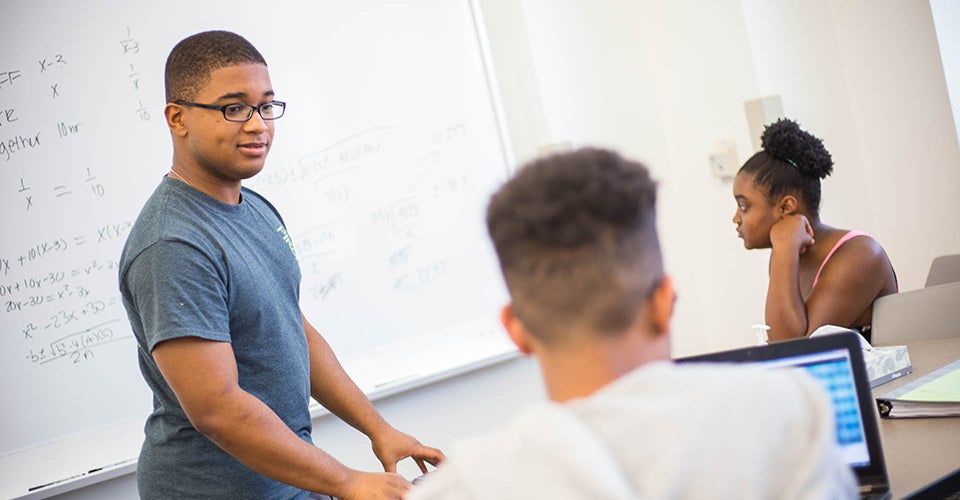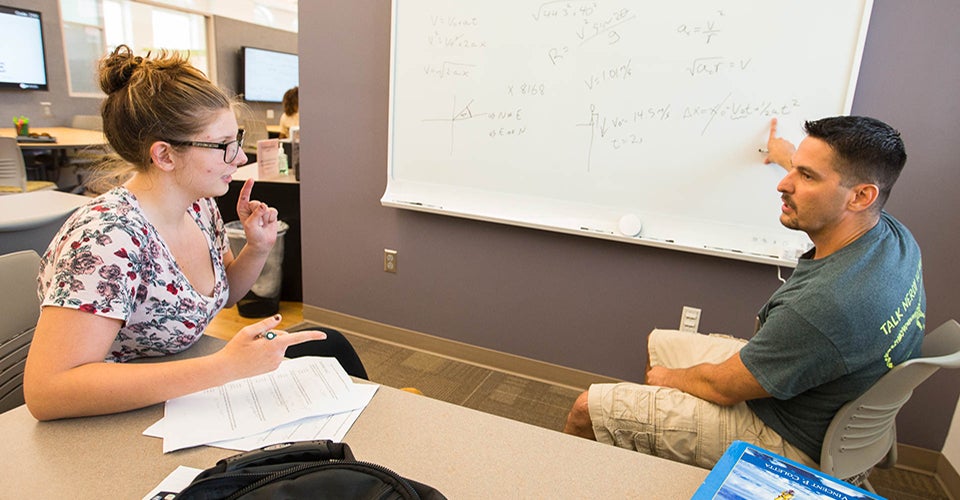GREEN TEAM
Project engages military students as tutors
Some have already served our nation’s military and returned to school under the GI Bill. Others are active duty members of the National Guard, Reserves or ROTC.
All are team-oriented, mission-focused and driven – attributes any employer would value – and they are serving their fellow students at East Carolina University’s Pirate Academic Success Center through a mutually beneficial program called the Green Team Project that engages military-affiliated students as tutors.
The program is part of ECU’s extensive efforts to be a military friendly university, said Elizabeth Coghill, director of the PASC. “They may have GI Bill benefits, but it doesn’t cover everything,” she said. “Many of our military folks have families, children and extra responsibilities, and they’re trying to get a degree.”
Started with UNC General Administration funds for special populations support and continued with help from a local community foundation, the Green Team Project offers a variety of benefits for participating service members. In addition to a paycheck and a flexible work schedule, tutors become more connected to other students and to faculty members within their own fields of study, reinforce their own learning and gain valuable work experience in a positive, collaborative setting.
“What the research shows us about the experience that our military students have is that they’re less connected on campus,” Coghill said. “They tend to isolate, because the worlds that they are living in are so different.”
Once they become a part of the PASC, she said, they are in constant contact with other students, they have a mission and they are part of a team. “It allows them to become more connected to what the university is all about,” she said. “They take that drive to serve that they had in the military and transition it to [this role].”
After serving all over the world in the Marine Corps, Jim Eisenmann was working for Jarrett Bay Boatworks in Beaufort when a coworker asked him, “What are you doing? You’re crazy – they’ll pay you to go to school.”
He did just that, starting with business classes at Carteret Community College. But when the economy turned south and he was laid off in 2009, then found out he had a child on the way, he began to rethink his future.
“I didn’t want to run a business, because I want to have time with my kid,” he said. “So I started looking at teaching, and that prompted me to go back to school for physics.”
Now with a bachelor’s degree under his belt, he’s working on a master’s degree in applied physics, with the goal of becoming a college professor. He has worked as a tutor throughout his time at ECU and said the experience has been invaluable.
“Tutoring physics, since it’s my major, these things that I try to teach people will be forever crystallized in my brain,” he said. “By helping other students it fortifies my understanding of the subject.”

Tutors and students have a variety of technological tools at their disposal in the Pirate Academic Success Center.
Since he’s a few years older than many of his fellow students, he said, “It’s hard to keep your finger on the pulse of what’s happening with the students coming in. But I get to interact with them and understand their culture, how they think and what their struggles are.”
Like Eisenmann, Guiseppe Jeanty’s experience has been a little different than that of the typical college student. Jeanty, a first-generation college student who grew up in Haiti, joined the Army National Guard after high school to help support his family after his mother’s cancer diagnosis.
“Afterwards I wanted to go back to school,” he said. “My major is engineering, and a lot of other schools wouldn’t accept someone coming off a year’s break. ECU gave me an opportunity and had faith in me.”
The college environment took some getting used to, he admitted. “Classes in the military are really engaging, and everyone is fully hands-on, awake, answering questions, really gung-ho. If someone told me something, I wouldn’t hesitate, I’d go ahead and do it,” he said.
On campus, the learning environment is more laid back, he said, and he quickly realized he would have to apply himself in his own study time.
Jeanty will receive a bachelor of science in engineering this December before being deployed to the Middle East with the National Guard, where he works in satellite and radio communications. He said his experience as a tutor has improved his problem-solving ability as well as his social skills.
“You come in here with a smile, and you get to meet all kinds of people working here on campus at the Pirate Academic Success Center,” Jeanty said. “With that, your social skills go way up and you realize that, hey, the students here are great. It’s actually easy to talk to them, you just have to step out and say hi.”
Connecting with other students has also showed him that his military service is appreciated, which he said he is proud to share with his family every chance he gets.
“Every time someone tells me they appreciate what I do, I go right back to my family and tell them, ‘hey, someone appreciated me, and that comes back to you guys,'” he said.
While Eisenmann and Jeanty joined the PASC after receiving emails inviting them to apply, Chris Garcia discovered the tutoring center when he needed help with his own introductory physics courses – the same courses in which he’s now tutoring other students.

From left, Chris Garcia uses an electronic whiteboard while helping William Hicks and Precious White study vectors.
“Tutoring benefits me by allowing, and even forcing, me to study and assimilate every small piece of information about the courses I tutor,” he said. “Every day I learn new tricks and am able to pass them along.”
The experience, he said, has also helped bring him out of his shell. “I describe myself as an introvert,” he said, “but if you told that to anyone I work with they’d probably laugh in your face.”
Especially meaningful, he said, is when a student he’s working with has an “Ah ha!” moment, when everything falls into place because of his efforts. “Those moments really make tutoring one of the most rewarding jobs I’ll ever have,” Garcia said.
Eisenmann agreed. “The best way to learn is to teach,” he said. “I think it’s the best job on campus. It directly impacts you as a student, and it’s just a win-win, really. You get to meet great new people, and it’s a fun place to work.”
Connecting with other students and using technology in the PASC are beneficial to military affiliated students, Coghill said. “We do processes in terms of interviewing and evaluations that mirror what students are going to experience in the work force. We do that because our military folks – all of our students, really – need to work on those workforce readiness skills.”
Each semester, there are about 20 Green Team tutors, out of a total 250 PASC tutoring staff. Each tutor works with an average of 200 students per semester. The feedback and outcomes have been overwhelmingly positive, Coghill said, and she hopes to encourage other universities to create similar programs.
“We really want to see our state, especially, begin to adopt these kinds of practices,” she said. “They make the best tutors. You can see the pride that they feel in being a tutor, and being connected with this place. It not only gives them a job, but it gives them their own success at the university.”

From left, Guiseppe Jeanty diagrams word problems with Shyheim Jones and Victoria McKinnon.
